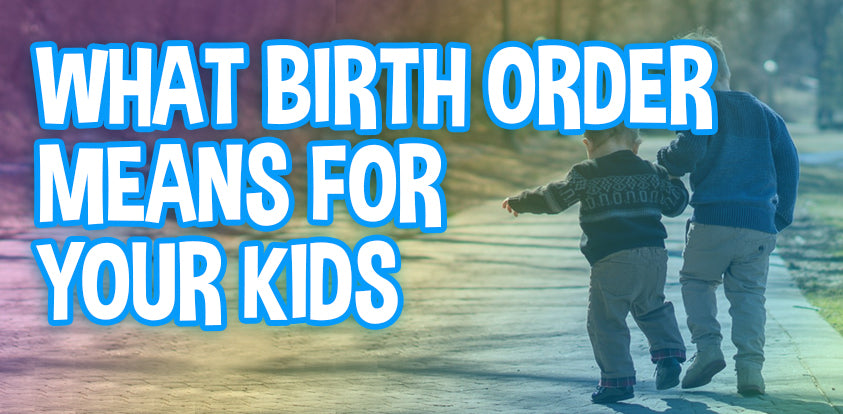
Birth Order and What It Means for Your Kids
Share

I didn't grow up in a gigantic family, but even with my tiny slice of anecdotal evidence I can tell you that birth order definitely means something. You might not be able to shape a child's personality by ensuring that they show up somewhere specific in the lineup, but your kids birth order will have far-reaching effects. There were three kids in our house growing up. All of them fell into these archetypes. When my mom remarried almost a decade later
Birth Order Influences:
Knowing which parent or groups your child might identify with based on birth order is an important thing to keep in mind when dealing with your children. It doesn't necessarily hold true for every kid or family, but it's an interesting thing to consider.

First-borns
The eldest child will often be task-oriented and productive. They thrive on influencing family decisions and traditionally identify most with the father. First born children enjoy productivity and seeing results. They might be slight perfectionists but are reliable, responsible, and well-organized. Your humble author is a first-born and I identify with these statements quite heavily.
Second-borns
The middle is a difficult spot to be based purely on my own anecdotal evidence. The middle children are usually more expressive and emotional, traditionally identifying more with their mother. Family mediation is their true gift and they tend to avoid conflict. Middle children can be described as mavericks with an innate need to feel like they belong. This leads to strict loyalty to their peer group. Sadly, studies have shown that there are the fewest pictures of these children in the family photo album which explains a lot of these characteristics.
Third-borns
You may or may not have a third-born. In my family the third born was the youngest, so we didn't technically get a third-born. So I can neither confirm or deny these statements. Third-borns tend to relate to pairs in the family (for example, two parents, two siblings, etc), are interested in maintaining balance in relationships between people, need to have choices and tend to use humor in dealing with situations.

Youngest
The youngest child generally gets the benefit of seeing the entire picture when it comes to their family. They'll focus heavily on maintaining cohesion but unlike the second-born mediators, they'll do so by hook or by crook. They can be manipulative, charming, precocious, engaging but often don't take responsibility for their own actions by nature of just being the perpetual baby of the family.
This held true in my own family, but my spouse is a youngest child that takes responsibility for everyone and everything like an eldest child so I say again that this is far from an exact science.
Balancing Birth Order
While the observations here aren't anywhere near 100% infallible, they definitely point out things that parents will need to be aware of when dealing with their children. If you've got an eldest child that is concentrated on results, it might be wise to teach them how to relax and take things easy. Show them that the weight of the world isn't on their shoulders.

Assure your middle child that they are loved and cared for. Tell them that you understand their emotions and what they are going through. In my experience, the middle child is difficult to deal with... But I can also understand through observing that it is a hard place to be. They'll need to blaze their own path, but you can let them know that you're with them every step of the way.
Youngest children need to be taught responsibility for their actions. The baby is often allowed to get away with far more than what is acceptable for every other member of the family because well... They're the baby. However, this shouldn't become the norm. The same rules and sense of responsibility needs to be applied to every member of a household in order for it to function properly.
Speaking of helping your household function, you might be interested in our How To on Google Family Link.

The Change-Up
One of the most difficult things to deal with is a shift in these dynamics. When my mom remarried I was in the middle of a blended family. I still remained the oldest and my sister was still the baby, but my new step-sister was less-than-excited to have the crown of oldest child given to what was essentially a complete stranger.
The best advice that I can offer is to give it time. Things will always return to equilibrium if you can simply wait it out. There was a bit of a power struggle, but I did eventually prove that I was a suitable eldest sibling and my step-sister and I soon developed a great relationship. Almost 2 decades down the road and we are closer than ever before.

Accepting What Is
The truth is that no matter which slot a child fills, they're going to be there for the foreseeable future and accepting that fact is vital to a happy and healthy mental state. Let your child know that they are loved and cared for no matter what role they play. I'm a big fan of these love reminders but simple rewards like curly shoelaces or rainbow shoe horns can help acceptance come that much faster.
